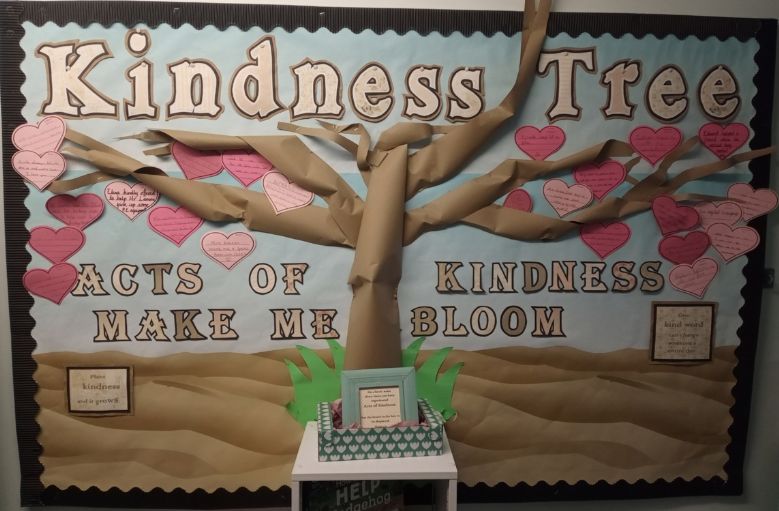PSHE
PSHE at St Peter’s
We know the importance of being kind to each other at St Peter's.
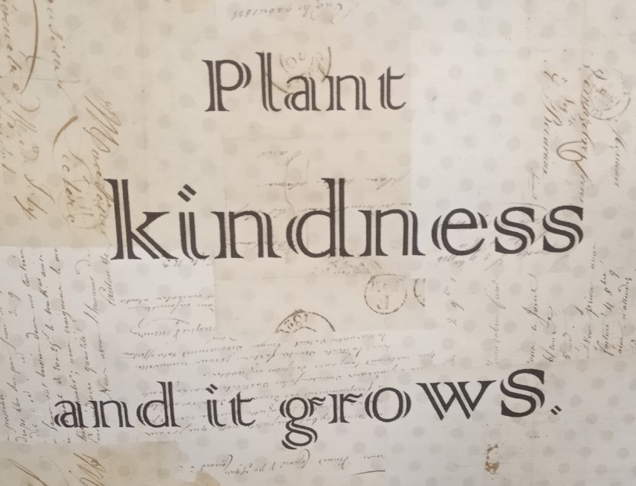
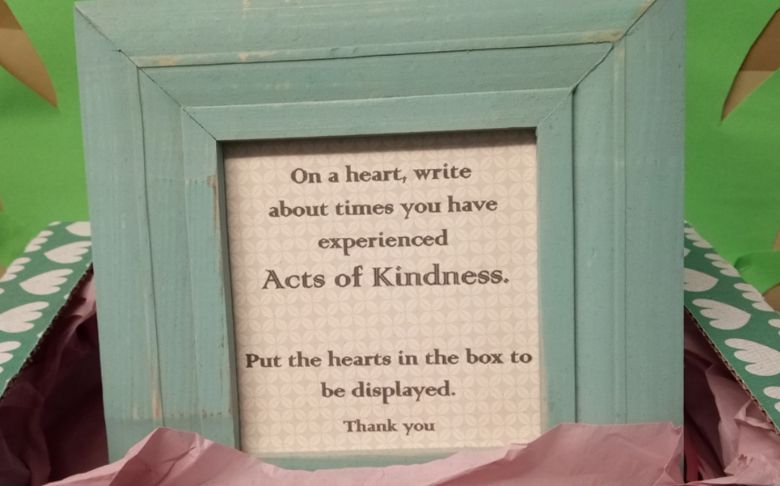
Intent
PSHE is at the core of what we do and enables our children to become not only more confident and happy learners, but to become responsible members of society. Confident pupils in themselves will lead to confidence across the curriculum and beyond in later life.
Our intention is that when children leave St Peter’s, they will do so with the knowledge, understanding and emotions to be able to play an active, positive and successful role in today’s diverse society. We want our children to have high aspirations, a belief in themselves and realise that anything is possible if they put their mind to it.
Faced with a challenging and ever-changing society, we aim to provide our children with a strong understanding of the diverse world around them and help them in playing a positive role in contributing to the school and the wider community around them. In an ever–changing world, it is important that they are aware, to an appropriate level, of different factors which will affect their world and that they learn how to deal with these so that they have good mental health and well-being.
PHSE is taught through the E4S scheme and it develops learning and results in the acquisition of knowledge and skills, which will enable children to access the wider curriculum and prepare them to be a global citizen now and in their future roles, within a global community. It promotes the spiritual, moral, cultural, mental and physical development of pupils, preparing them for the opportunities, responsibilities and experiences for later life. For further details about Relationships and Sex Education, please see details on the page link on the left-hand side.
As our Mission Statement shows, 'love' is at the centre of everything we do at St Peter's and this is evident in our PSHE work. We follow a bespoke curriculum, tailored to the needs of our school and pupils, supported through the West Sussex E4S project - which we began in January 2021.
Implementation
PSHE is taught across the school from Reception to Year Six on a weekly basis.
The children keep an 'E4S Journal' that helps them reflect upon their learning in this area. Please look below for our draft scheme of work. Please note that this will be reviewed and amended as we follow it for the first year.
EYFS - In the Foundation Stage, PSHE and citizenship is taught as an integral part of topic work and is embedded throughout the curriculum.
Key Stage 1 and Key Stage 2 - At Key Stage 1 and 2, pupils are taught PSHE using the ‘West Sussex- Education for Safeguarding’ (E4S) curriculum.
At St Peter’s Primary School, we promote personal wellbeing and development through a comprehensive 'Education for Safeguarding' (E4S) curriculum. The West Sussex Education for Safeguarding (E4S) curriculum is based on the national Department for Education Relationships, Sex and Health Education (RSHE) guidance and numerous national frameworks, including the PSHE Association, but adapted and enriched for schools in West Sussex. This has been developed via a multi-agency approach combining teams from Safeguarding in Education, Contextual Safeguarding, Health and Education in West Sussex.
We believe that E4S helps to give pupils the knowledge, skills and understanding they need to lead confident, healthy, independent lives, in order to become informed, active and responsible citizens. By enabling our children to develop their skills, knowledge and understanding of self-safety, encouraging them to develop a strong moral purpose and providing insight into the ever-changing world they are growing up in. Attitudes, beliefs and - most importantly - behaviours learned during childhood show a strong tendency to continue into adulthood; establishing resilience, confidence and empathy during these formative years is a key priority.
At St Peter’s Primary School we have used the West Sussex E4S toolkit to create a bespoke, needs-based E4S curriculum.
E4S at St Peter’s is based around the four Cornerstones of: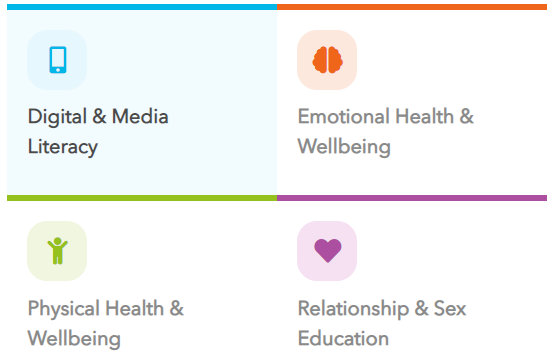
· Digital and Media Literacy
· Physical Health and Wellbeing
· Emotional Health and Wellbeing
· Relationship and Sex Education
Through creating a personalised and progressive curriculum that is specifically relevant to St Peter’s Primary School’s community, learning experiences related to these four cornerstones support our pupils in developing the skills, knowledge and understanding for their own safeguarding, health and wellbeing. We believe the teaching of E4S should be shared with parents/carers and be mutually supportive and complementary.
It is our intention that all pupils have the opportunity to experience a programme of E4S at a level which is appropriate for their age and physical development with differentiated provision as required.
Definitions of the E4S ‘Cornerstones’
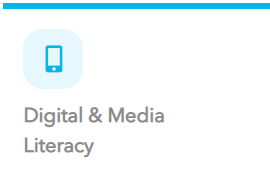 Digital & Media Literacy
Digital & Media Literacy
It is important that in modern Britain, young people have the skills and knowledge to be able to navigate the rapidly evolving digital world and explore the positive contributions the Internet creates, whilst also ensuring that they are critical thinkers, can recognise risk and develop effective strategies for staying safe online.
The Digital and Media Literacy cornerstone will enable this by providing pupils with crucial insight into five key concepts: Online content and critical thinking; Self-image, mental health and wellbeing; Staying safe online; Online reputation and Online relationships and cyberbullying. In addition, pupils will also be taught about the benefits of rationing time spent online and the risks of excessive use of electronic devices.
Pupils will be taught why social media, computer games and online gaming have age restrictions and be equipped to manage common difficulties encountered online.
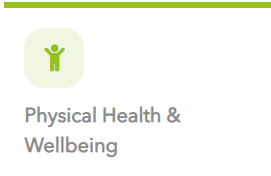 Physical Health & Wellbeing
Physical Health & Wellbeing
Physical Health and Wellbeing education is learning about the characteristics of good physical health, wellbeing and the connections between our bodies, minds, behaviours and wellbeing. The fundamental building blocks across all age phases include the benefits and importance of exercise, nutrition, sleep, hygiene, healthier lifestyles, substances, health prevention, emergencies and keeping safe and taking risks.
It also focuses on the steps pupils can take to protect and support their own and others’ health and wellbeing. This should enable pupils to develop the knowledge, skills and understanding needed to develop the language to talk about their bodies, health and lifestyles and express whether what they are feeling and how they are behaving is appropriate and proportionate for the situations that they experience.
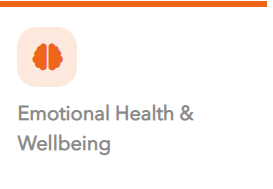 Emotional Health & Wellbeing
Emotional Health & Wellbeing
Emotional Health and Wellbeing is about learning the characteristics of positive mental health and wellness, and exploring how pupils can best maintain these. Teaching ways to recognise challenges to emotional health and helping students develop strategies to cope is of paramount importance. This includes how cope with loss and manage changing situations. Pupils will be encouraged to discuss and recognise their own strengths, achievements and success.
Universal emotional health and wellbeing curriculum within an effective whole school approach is a truly proactive way in which schools can make a real difference to the lives of their pupils. There is clear evidence of positive impacts on: academic learning; staff and pupil wellbeing; the development of social and emotional skills and attitudes that promote learning in school and throughout life.
The prevention of mental health problems such as depression, anxiety and stress; improving school behaviours and reductions in risky behaviour is also a key element of this cornerstone. There is significant evidence that good emotional health and wellbeing also contributes to good physical health.
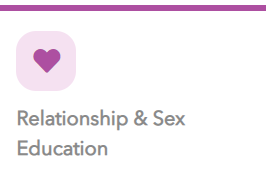 Relationship and Sex Education
Relationship and Sex Education
Relationship Education in Primary schools is learning about the emotional, social and physical aspects of growing up and a range of different relationships. The fundamental building blocks at Primary School will be the characteristics of positive relationships, friendships, family relationships, relationships with other children and with adults and feeling safe.
Relationship and Sex Education will equip pupils with the information, skills and values to have safe, fulfilling and enjoyable relationships. Please see the link on the left-hand side for further details of how we deliver RSE at St Peter’s.
Aims
The aims of the E4S curriculum at our school are to:
· provide the knowledge and information to which all pupils are entitled
· help children to develop feelings of self-respect, self-esteem, self-confidence, sympathy and empathy
· Provide the confidence to be participating members of society and to value themselves and others;
· Give them an understanding of the importance of health and hygiene
· Develop understanding of the characteristics of positive mental health and wellness, and exploring how pupils can best maintain these
· Help pupils develop communication skills and assertiveness skills to cope with the influences of their peers and the media
· Help pupils develop respect and care for their bodies
· Ensure young people have the skills and knowledge to be able to navigate the ever-changing digital world and explore the positive contributions the Internet creates, whilst also ensuring that they are critical thinkers, can recognise risk and develop effective strategies for staying safe online
· Answer pupils’ questions honestly and sensitively – referring the children to parents where appropriate
· Give them information on where individuals and families can get help and support
· Provide a framework in which sensitive discussions can take place
· Create a positive culture around issues of relationships
· Equip pupils with the information, skills and values to have safe, fulfilling and enjoyable relationships
· Prepare pupils for growing up in the changing world and encourage them to take responsibility for their own actions
Curriculum
High quality, evidence-based and age-appropriate teaching of E4S can help prepare pupils for the opportunities, responsibilities and experiences of adult life. They can also enable us to promote the spiritual, moral, social, cultural, mental and physical development of pupils, at school and in society.
E4S will be taught throughout the whole school year with elements from each Cornerstone being taught within each term. E4S sessions typically are taught across the school each Monday morning,
PSHE also identifies links to British Values, and SMSC and is taught in such a way as to reflect the overall aims, values, and ethos of the school.
Wider Curriculum
-
We believe that supporting children to think about the four cornerstones will help them to build resilience, independence and confidence; embrace challenge; foster a love of learning; and increase their level of happiness. We do this through the language we use in class, praising children for their efforts, and using language to encourage children to challenge their way of thinking.
-
PSHE is an integral part of the whole school curriculum, and is therefore often taught across all subject areas as well as the focused Monday sessions.
-
We encourage our pupils to develop their sense of self-worth by playing a positive role in contributing to school life and the wider community.
-
Assemblies are used to support learning in PSHE when appropriate, though cannot replace focused learning of an area.
Impact
By the time our children leave our school they will:
-
be able to approach a range of real-life situations and apply their skills and attributes to help navigate themselves through modern life
-
be on their way to becoming healthy, open-minded, respectful, socially and morally responsible, active members of society
-
appreciate difference and diversity of the world that they live in.
-
recognise and apply the British Values of Democracy, Tolerance, Mutual respect, Rule of law and Liberty
-
be able to understand and manage their emotions
-
be able to look after their mental health and well-being
-
be able to develop positive, healthy relationship with their peers both now and in the future.
-
understand the physical aspects involved in RSE at an age-appropriate level
-
have respect for themselves and others.
-
have positive self-esteem

